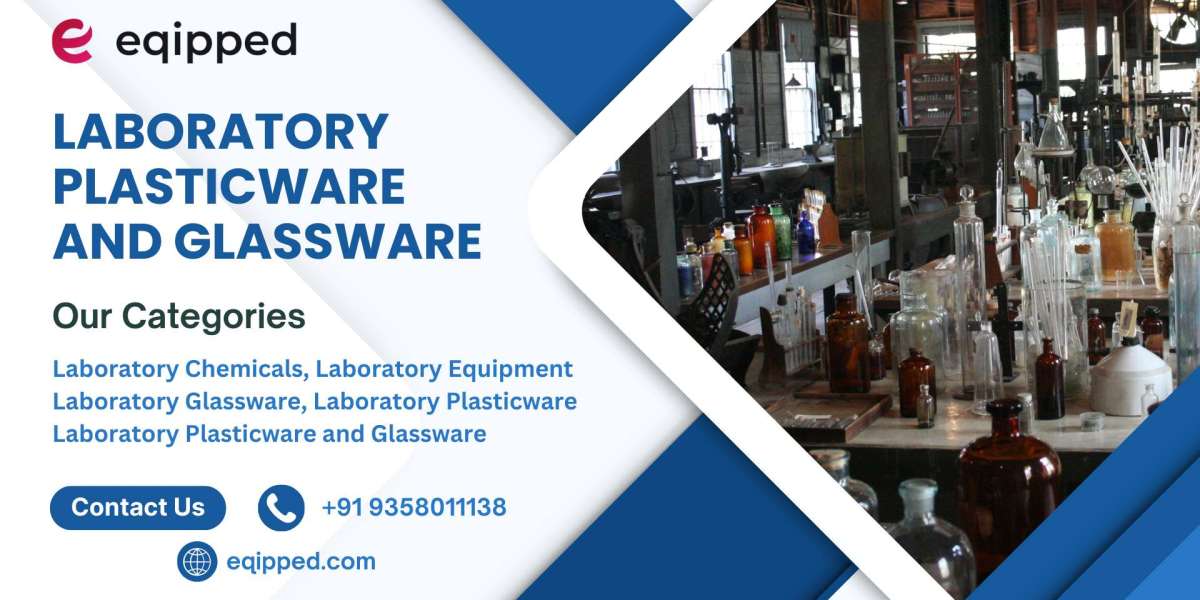When it comes to outfitting your lab—be it academic, clinical, industrial, or research-focused—making smart choices in your equipment is vital. At the heart of daily lab operations are Laboratory Plasticware and Glassware—each with unique strengths. Knowing when to use plastic or glass can transform accuracy, safety, budget, and workflow efficiency.
At Eqipped, we offer a finely curated collection of both lab-grade plasticware and glassware to optimize your lab’s functionality and performance.
Why Focus on Laboratory Plasticware and Glassware?
Versatility: From conducting titrations to culturing cells, these tools are essential for virtually every experiment.
Safety & Compatibility: Plasticware excels in fragile environments, while glassware handles high-heat or chemical reactions.
Cost & Value Over Time: Plastic is ideal for high-volume or consumable needs, glass offers long-term precision and durability.
Operational Efficiency: Choosing the right material ensures smooth, seamless laboratory workflows.
When Plasticware Shines
Highly Durable & Safe: Resistant to breaking, making it perfect for high-traffic or student laboratories.
Easy to Handle: Lightweight and ergonomic—ideal for repetitive use or handling large volumes.
Economical: Affordable especially for disposable or frequently replaced items.
Sterilizable & Chemical-resistant: Quality plasticware maintains reliability through autoclaving and withstands common reagents.
Glassware: When Precision Is Everything
Exceptional Heat & Chemical Resistance: Glass excels in high-temperature and corrosive environments.
Superior Accuracy: Tooling like volumetric flasks and burettes offers precise, reliable measurements vital for analytical work.
Long-lasting Use: With proper care, glassware delivers years of dependable performance.
Visual Clarity: Transparent surfaces aid clear sight of reactions, readings, and meniscus placement.
Comparison at a Glance
| Feature | Plasticware | Glassware |
|---|---|---|
| Breakage Risk | Very low; high durability | Higher; must be handled carefully |
| Weight | Lightweight and ergonomic | Heavier, less convenient for extended use |
| Cost Efficiency | Budget-friendly, especially for disposables | Higher initial investment, lasts longer |
| Heat & Chemical Use | Limited, varies by polymer | Excellent resistance to heat and chemicals |
| Measurement Precision | Moderate | High precision, ideal for analytical tasks |
| Sustainability | Sometimes recyclable, but single-use common | Designed for repeated use, less waste |
Practical Usage Tips
For Plasticware:
Opt for autoclavable materials like polypropylene for reliable reuse.
Replace plastic items when they become scratched or cloudy; these can harbor contaminants.
Clean with care, avoiding harsh chemicals or abrasive brushes.
For Glassware:
Inspect regularly for chips or cracks.
Heat gradually and never plunge hot glass into cold water.
Use gentle cleaning agents and store in padded racks for longevity.
What’s in Our Laboratory Plasticware and Glassware Range?
Beakers, Measuring Cups, & Safety Funnels – Everyday essentials for pouring, mixing, and measuring.
Test Tubes, Petri Dishes & Culture Plates – Perfect for micro-scale tasks and maintaining sample sterility.
Pipettes, Volumetric Flasks & Burettes – Designed for accuracy—from microliters to exact volumes.
Storage & Sample Handling – Bottles, jars, and microvials designed to keep your contents secure and uncontaminated.
FAQs: Your Top Questions Answered
Q1: Should I only use plasticware to avoid breakage?
Not necessarily. While plastic is safer, glassware is irreplaceable for heat-based or precision tasks. A balanced mix works best.
Q2: Is all plasticware safe for autoclaving?
No. Only specific polymers like polypropylene tolerate heat; always confirm material properties before sterilizing.
Q3: Can plasticware affect measurement accuracy?
Plasticware is fine for general use. For tasks requiring high precision—like quantitative titrations—glassware remains the standard.
Q4: Can glassware be reused indefinitely?
With proper cleaning and care, yes. However, always inspect before use and retire any cracked or chipped items.
Q5: How do I choose the best tool for my experiment?
Consider temperature, chemical exposure, precision needs, and handling conditions. Use plasticware for convenience and glassware for precision-intensive work.
Incorporating Both Materials for Better Labs
Most well-run labs leverage both plasticware and glassware strategically. Plasticware enhances usability and safety in routine tasks, while glassware supports accuracy and stability for critical measurements. This approach optimizes performance without compromising safety or budget.
At Eqipped, the Laboratory Plasticware and Glassware category supports this balanced strategy—providing quality selections designed for your lab’s efficiency, safety, and scientific excellence.








